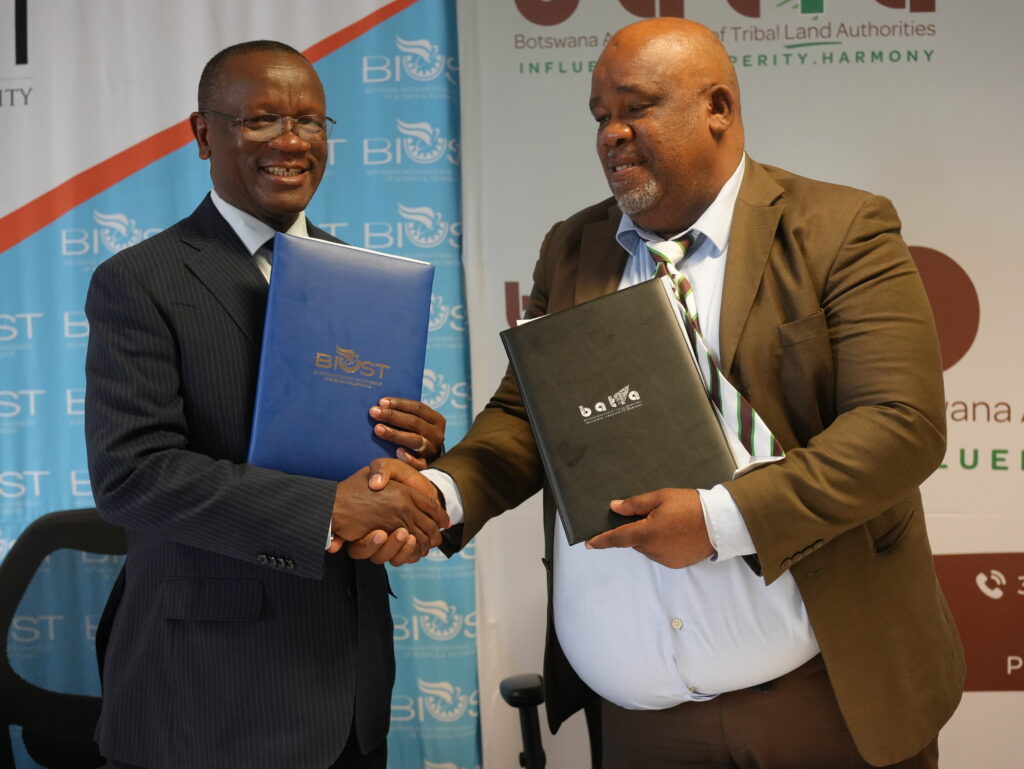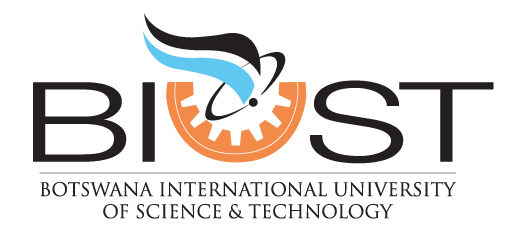
Vice Chancellor Professor Otlogetswe Totolo recently hosted the President of the Botswana Association of Tribal Land Authorities (BATLA), Mr. Kgang Kgang, and his entourage to formalize a partnership between their organizations. This collaboration marks a significant step toward advancing sustainable land use, community empowerment, and the development of innovative solutions for the benefit of the people of Botswana.
BATLA, an organization representing the interests and concerns of tribal land authorities in Botswana, was established by an Act of Parliament in 2018. Among its key focuses are policy development and implementation, where it contributes to national land policies and legislation by providing input and recommendations based on the experiences and needs of tribal land authorities. BATLA also assists in the implementation of these policies, ensuring they align with the interests and traditions of tribal communities. Additionally, BATLA is committed to conflict resolution, offering mediation and legal support when necessary, and it undertakes research initiatives to gather data on land use patterns, challenges, and opportunities within tribal areas.
Professor Totolo emphasized that BIUST is dedicated to driving research and innovation with the goal of societal transformation, aligning with Botswana’s economic and social transition. “For us to achieve this mandate, we have elevated the power of collaboration and partnerships to the top tier of every effort we undertake,” he stated. With the signing of this memorandum of agreement, both parties aim to establish cooperation for the management and planning of land use, enabling knowledge-based decision-making for sustainable land resource utilization. BIUST and BATLA also intend to strengthen capabilities through collaborative projects, research, education, and the development of programs for the management and planning of land resources. Additionally, they seek to provide expanded and improved opportunities for staff involved in land-related sectors through training and exchange programs.
“Success lies in working together and finding points of convergence in our respective mandates. One of our driving pillars as an organization is Social Relevance because we view education and community development as inseparable. Our mission goes beyond the classroom; it extends into the lives of our communities, and the MOU we are signing today embodies that commitment,” Professor Totolo remarked.
In his speech, Mr. Kgang expressed hope that through this partnership, BIUST’s drones would be used for mapping and 3D modeling to create accurate maps and models of selected land prior to allocations. This technological advancement, he noted, would streamline their operations, significantly reducing turnaround times in service provision to Batswana. Mr. Kgang also mentioned his desire for technology transfer, to which Professor Totolo responded by highlighting that BIUST is home to leading experts in environmental science, agricultural technology, and land management sciences. Through this partnership, the two organizations will engage in joint research projects aimed at promoting sustainable land use practices, preserving natural resources, and enhancing agricultural productivity. “We will create platforms for exchanging knowledge and best practices between our researchers and BATLA’s experienced land managers, fostering a culture of continuous learning and innovation,” the Vice Chancellor added enthusiastically.
One of BATLA’s primary focuses is capacity building, specifically in sensitizing land board members and staff on modern technological land management systems. Professor Totolo announced that BIUST would support this initiative by developing and implementing training programs tailored to the needs of tribal land authorities. These programs will cover topics such as land administration, environmental stewardship, conflict resolution, and community engagement. Regular workshops and seminars will be organized to keep BATLA’s partners updated on the latest developments in land management and to provide ongoing professional development opportunities.
In concluding his remarks, Professor Totolo congratulated BATLA and all involved parties for achieving the President of the Republic of Botswana, His Excellency Dr. Mokgweetsi Eric Keabetswe Masisi’s target of allocating 100,000 plots. “I can assure you that with the application of technologies and the diverse skills available at BIUST, the land boards will become even more efficient and robust in the allocation of land to our people,” he concluded.
The signing of this memorandum promises fruitful benefits not only for BIUST and BATLA but also for Batswana at large, whose interests both organizations are committed to serving. The assembly concluded with a tour of BIUST’s Soil Science Lab, Geographical Information Systems Lab, and the Botswana Satellite Station.
